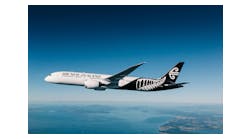March 12--American Airlines was sued Tuesday by Chicago's regional transportation agency, which claims the carrier engaged in a decadelong practice of illegally diverting millions of dollars in sales taxes it owed on jet fuel purchases.
The airline says it is complying with the law.
The Regional Transportation Authority claims in a lawsuit that it is due some of the sales tax collected on fuel purchases that American Airlines Group made through a sales office in Sycamore, Ill. In 2013, the practice cost Chicago, Cook County and the RTA system, which includes the CTA, Metra and Pace, nearly $24 million, the RTA said.
The lawsuit is part of the RTA's ongoing attempt to recoup some of that money, especially in light of recently proposed changes in the state tax code to eliminate what government officials describe as a loophole exploited by dozens of companies.
The RTA was waiting for American Airlines to emerge from bankruptcy protection before it filed suit. The company came out of bankruptcy and combined with US Airways on Dec. 9. The RTA, which relies on sales tax for more than half its operating budget, has already sued other entities over the same issue, including the parent of United Airlines.
"We're going to continue to go after companies not paying the appropriate tax," said Jordan Matyas, the RTA's chief of staff.
He contends American owes sales tax on fuel purchases made through a subsidiary and noted that the airline's local employees and passengers use RTA transportation.
"Certainly, they are a large player in our corporate community, and it's disappointing that they would choose not to support mass transit in Chicago and Cook County but instead play these games to increase their profit margin," Matyas said.
American Airlines asserts its fuel-buying operation is legal.
"We believe that we are still paying the proper amount of retailer's occupation tax and that we are in compliance with the law," American spokeswoman Mary Frances Fagan said, declining to comment further without seeing the lawsuit.
The tax controversy stems from a relatively unusual Illinois rule in which sales tax was applied where an offer was accepted, rather than where a product was delivered to the customer. Over the years, companies have used an aggressive strategy to avoid higher sales tax rates in the Chicago area.
The tax strategy involved shifting the official point of purchase to a lower-tax venue. To do this, companies opened satellite sales offices in Kankakee, Channahon and other outlying municipalities. Those cities offered to share their local tax receipts with the companies as an incentive to establish sales-processing offices.
The issue came to a head in November, when the Illinois Supreme Court struck down the sales-tax regulations. In January, the Revenue Department followed up by issuing emergency guidelines, which it proposes making permanent, that put businesses through a more rigorous test to determine the source of sales taxes. The place of order acceptance is no longer the sole factor; companies now must take into account other factors such as the location of inventory and sales executives.
In the case of American Airlines, the carrier makes jet fuel purchases through a subsidiary, American Aviation Supply LLC, located in the rural community of Sycamore in DeKalb County.
A deal between American and Sycamore calls for the municipality to give back to the company most of the sales tax collected in the form of "economic incentive" payments, effectively reducing the airline's costs. American operates a small office out of Sycamore's City Hall, and no jet fuel is ever delivered to Sycamore, the RTA said.
The RTA claims American's practice of buying fuel through Sycamore, which may date back to 2004, last year alone cost the city of Chicago $11.5 million, Cook County $3.8 million and the RTA $8.3 million.
In a complaint filed Tuesday in Cook County Circuit Court against American Airlines Group, American Aviation Supply and the city of Sycamore, the RTA said the case was about "an unlawful scheme, perpetrated by the world's largest airline, its fuel subsidiary and an Illinois municipality, to avoid the payment of taxes due to the RTA by falsely reporting the site of bulk jet fuel sales."
It notes American's fuel sales office is a 750-square-foot space located on the mezzanine level of Sycamore City Hall and staffed by only a few people. A call requesting comment from the Sycamore city manager was not returned.
The suit claims American Airlines conducts its actual selling activity within RTA's taxing jurisdiction at and near Chicago's O'Hare airport. The RTA wants from the court a declaration that the American Airlines subsidiary actually buys fuel in RTA's taxing jurisdiction and asks for unspecified back tax money and damages.
Follow @SpendingSmart Follow @chibreakingbiz
Copyright 2014 - Chicago Tribune




